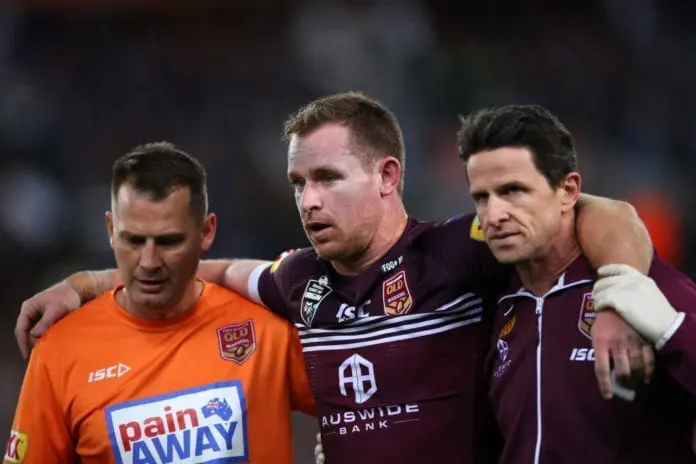Well, you certainly can't make claims of NRL players being 'money hungry' ever again.
Players across the competition are rallying as they look to confirm a $10 million sacrifice from their own pay packets in order to assist retired and uncontracted players through financial hardship.
While the obvious allocation of funds will be retired players at the backend of their career looking to transition into post-football life, there is a large assortment of players who haven't picked up a deal, or that have suffered a long-term injury in a contract year that need financial help.
Haze Dunster, for example, is a lucky one (to some extent).
The Parramatta winger re-signed through to the end of the 2025 season with the Eels, less than two months before snapping his ACL, MCL and PCL in a trial match earlier this year.
Had he been out of contract this year, there's probably a high chance no club would be willing to take a punt on him, leaving him without a source of income.
Aaron Booth is another, although a little more unfortunate.
Suffering a similar injury to Dunster in recent weeks, Booth isn't signed for 2023, meaning the recovering hooker could be left stranded come November 1.
The new initiative from the Rugby League Players Association (RLPA) ensures that these cases would be looked after by them, and guarantee that no player, retired or injured, will be left out in the cold by rugby league.

Premature retirements have increased over recent years, the increased information on the long-term effects of concussion have seen a handful hang up the boots, as have other niggling serious injuries.
Former Cowboy Michael Morgan is one of them, and as a representative of the RLPA, is involved in negotiating the deal.
“A lot of players struggle in retirement. The RLPA wants the responsibility of looking after retired players. You don’t want anyone leaving the game facing hardship," Morgan told The Daily Telegraph.
"I’ve been in a lot of RLPA discussions, particularly at the back end of my career.
“A lot of it was about looking after the bottom-end players first. It was genuinely a priority.
“It doesn’t matter if you’ve played one game or 300. It has never been about the stars just saying we want more money.”
Boss of the RLPA, Clint Newton, believes the proposed fund has been a long time coming.
“In the current CBA, clubs are only obligated to assist players for surgery for the first 12 months of retirement. Then players are on their own.
“We want to keep a long-term watch on them. Some players retire and need a shoulder reconstruction, a knee clean-out and maybe ankle surgery.
“That puts pressure on the player. How do they find work with all this going on?”
With the average span of an NRL career clocking in at just under 50 games, the initiative is essential not just for 300 NRL game stars, but for the fringe players as well, who don't earn millions and millions throughout their career.






